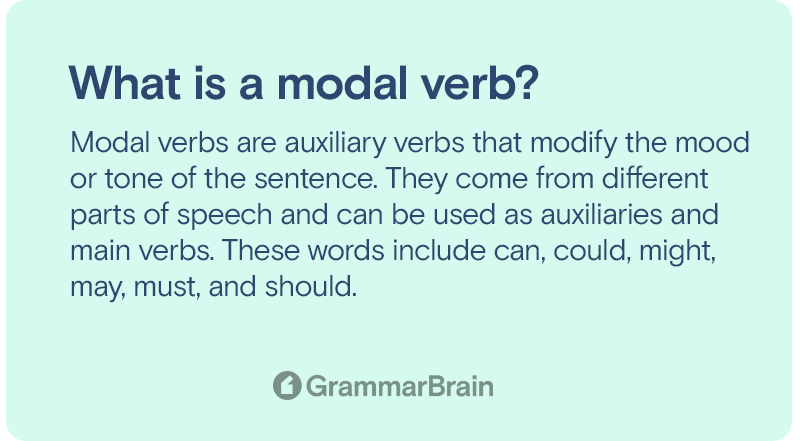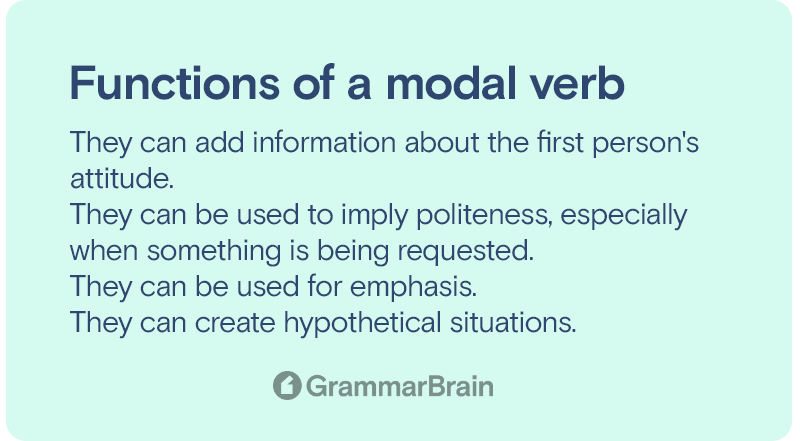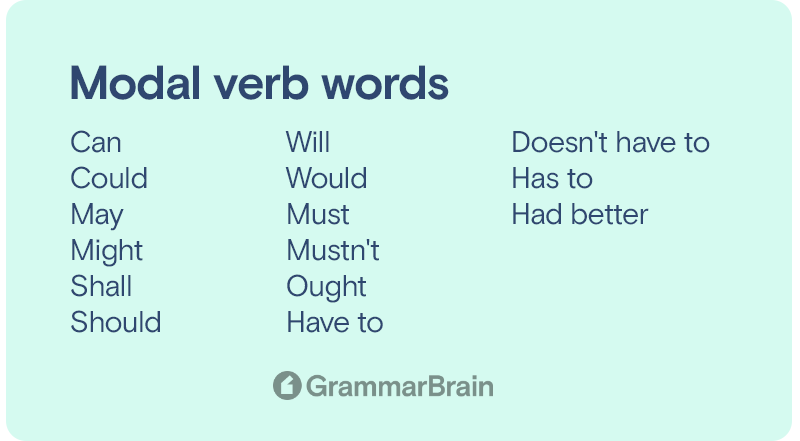What are modal verbs? How do modal verbs work? Modal verbs are perhaps the most confusing part of the English language. It is perplexing, especially for non-native speakers who have never heard of them.
Do you know when to use ‘can’ or ‘may’? What about ‘would’ versus ‘could’? Modal verbs may seem confusing, but the English language can’t do without them.
So, it is crucial to understand how and where to use them. Not to mention the differences between them, and how to recognize them to make your writing clearer and more effective.

What are modal verbs?
Definition
Modal verbs are auxiliary verbs that modify the mood or tone of the sentence. They come from different parts of speech and can be used as auxiliaries and main verbs. These words include can, could, might, may, must, and should.
For example, if you wanted to say, “I think I will be able to do it”, you would use ‘can’ as the modal verb instead of using ‘will be able to.’
If you wanted to say, “It is possible that they will come tonight,” you would use ‘might’ as the modal verb.
Difference between Modal and Regular verbs
Regular verbs are verbs that have a definite tense and person. They also happen to be the most common type of verb in English. Regular verbs mostly end in either ‘-ed’, ‘-d’, or ‘-t’. ‘He walked,’ ‘She talked,’ and ‘I wanted to’ are all examples of Regular verbs.
Modal verbs are different from regular verbs in that they can’t be conjugated as such. They only exist in the present tense and don’t change with a person, tense, or number. That means you will never see them ending in ‘-ed’, ‘-d’, or ‘-to.
What are Modal Auxiliary Verbs?
Auxiliary verbs are usually used in conjunction with the main verb of a sentence. They are also called ‘helping verbs’ because they help express what the subject is doing.
Auxiliary verbs also give more information about tense and other aspects of time. Some examples of auxiliary verbs are ‘could,’ ‘have,’ ‘should have,’ and ‘might have.’

Functions of Modal Verbs
The modal verbs have various functions, some of which are as follows:
- They can add information about the first person’s attitude.
- They can be used to imply politeness, especially when something is being requested.
- They can be used for emphasis.
- They can create hypothetical situations.
What are the types of Modal Verbs?
There are five main modal verbs: the verb ‘Can’, the verb ‘May’, the verb ‘Must’, the verb ‘Shall’, and the verb ‘Will’.
1. Can (Ability):
It is one of the most common modal verbs. It is used in affirmative as well as negative sentences. For example, “I can play the piano” and “I can not play the piano.”
In affirmative sentences, ‘can’ implies that somebody has the ability or skill to do something. In negative sentences, ‘can’ implies that they do not have the ability or skill to perform that particular task.
2. May (Permission):
‘May’ is a modal verb that lets you talk about possibility. It is followed by the infinitive of the main verb in the sentence. It means something along the lines of ‘to have permission to do something’ or ‘to be allowed to do.’
For example, “You may borrow my pen.” In this sentence, you are granting somebody else permission to borrow your pen.
3. Must (Obligation):
The verb ‘must’ is another modal verb. It is used to show obligation, duty, or necessity.
For example, “You must go wherever your duty calls.” In this sentence, the verb ‘must’ indicates that there is an obligation for the second person to go.
4. Shall (Polite Requests):
It is the most formal of all modals. It is used to make polite requests or give instructions. It differs from other modal verbs in how less frequently it is used in everyday speech.
For example, you might say “I shall call you later” when speaking to someone you don’t know very well. But most of the time, you are likely to use “I will call you later” instead.
5. Will (intention/willingness):
‘Will’ is a modal verb that expresses one’s intention. It can be used either as an auxiliary verb or as an adverb.
For example, “I will do it later.” Another example would be, “They will definitely take this into account.” Also remember, the words ‘will’ and ‘would’ are almost interchangeable when used in sentences.
When are modal verbs used?
Modal verbs are used as auxiliary verbs in the English language. They are used as part of a verb phrase or clause and express the speaker’s attitude towards what they are saying.
For example, in the sentence “I should eat more vegetables”, the speaker is expressing that he or she feels obligated to eat more vegetables. In this example, ‘should’ is used as an obligation modal verb.
How to use modal verbs
Modal verbs can be used in many different ways. Here are some of the ways you can use modals in a sentence:
“I might need help.” Here, the speaker does not know for sure whether he/she will need help or not.
“You must come.” This sentence indicates a command or an unequivocal request.
“I may have time later.” The speaker says this with uncertainty, as they do not know if they will have time later
Grammar rules with Example Sentences
As we know, a modal verb is an auxiliary verb that changes the meaning of the main verb. In other words, it has a modifying effect on the main verb’s meaning.
For example, if you say, “I will swim,” you are suggesting that you will only swim in the future. If you say, “I can swim,” then you are showing ability or skill in swimming.
The two sentences are not interchangeable because they change the meaning conveyed to the listener.
Another way to think about this is by using ‘could’ and ‘could have.’ If someone says, “I could have done better”, he/she means they were capable of doing better.
However, if someone says, “I could do better”, he/she means to say they have the ability or skill but didn’t use it.
Modal verbs + Present Tense
To use the present tense with modals, conjugate the verb in question and insert a form of ‘can’ or ‘will.’
For example, if you wanted to say that a person is able to swim (as of now), you would say “He can swim”.
Modal verbs + Past Tense
The most important thing to remember about modals is that they always go with the base form of the verb.
For instance, if you want to use a modal in the past tense, you will need to use ‘had.’ So, instead of saying ‘I can’t’ or ‘I don’t have the time’, you would say ‘I couldn’t’ or ‘I didn’t have the time’.
Modal verbs + Future Tense
The future tense requires modals such as ‘will’ and ‘shall.’
So, for example, if you want to say that something is going to happen in the future, you should say something like, “I will go to the store tomorrow.”
However, sometimes it can be challenging to know whether to use a present or past verb when describing something that will happen in the future.
For example, if you were talking about a concert next year and said, “I’m going to this concert next year,” does this mean that it’s happening now? Or are we going off on an assumption of what might happen? In this case, you should use ‘will.’

Modal Verbs List
- Can
- Could
- May
- Might
- Shall
- Should
- Will
- Would
- Must
- Mustn’t
- Ought
- Have to
- Doesn’t have to
- Has to
- Had better
- Dare (only in certain cases)
- Need (only in certain cases).
Tips for using modal verbs
Modal verbs have their own set of rules and meanings. They can be tricky for non-native English speakers, so getting familiar with how they work is important.
Below are ten tips for using modal verbs correctly and effectively:
- Don’t use ‘can’ when you mean ‘may.’ Incorrect sentence: “She may go home now.” Correct sentence: “She can go home now.”
- When ‘can’ means ‘might,’ the verb is in the past tense.
- When ‘will’ is replaced by ‘would like to’, the meaning changes depending on whether you are talking about future plans or expressing desires in the present. Example sentence 1: “I will buy myself something nice today.” (I plan on doing this sometime in the near future.) Example Sentence 2: “I would like to buy myself something nice today.” (I want to do this right now, but it isn’t possible)
- The following two sentences explain the differences between ‘should’ and ‘must.’ “She must leave now.” “You should study.” The first sentence tells someone what to do because there is no other option. The second sentence suggests that if someone chooses not to study, there will be consequences.
- Be careful not to confuse ‘ought’ with ‘had better.’ ‘Ought’ refers to moral obligation, while ‘had better’ refers to advice. Example sentence 1: “You ought to study more”. Example sentence 2: “You had better go home early tonight since it’s going to rain soon.”
- ‘Will’ doesn’t always imply a promise. Sometimes it just expresses future probability. Example sentence: “It will probably rain tomorrow.” Meaning: There is a high chance that it will rain tomorrow, but we don’t know yet.
- Use ‘might’ to express ‘possibility’ and use ‘could’ for ‘probability.’ ‘Might’ is more tentative than ‘could’. ‘Might’ makes it seem less likely that an event will happen, whereas ‘could’ makes it seem more likely to happen.
- If you want to express desire, use ‘would.’
- To ask permission, use ‘may.’
- To politely offer help, use can/may.
FAQs
What is a modal verb?
Modal verbs are auxiliary verbs that come before the main verb and which modify the meaning of the main verb. For example, ‘may’ is a modal verb indicating permission is unnecessary, while ‘must’ means the act is mandatory.
How many modal verbs are in total?
There are about 24 modal verbs.
What are the most common modal verbs?
There are several modal verbs that can be used in English, but ‘can’, ‘could’, ‘may’, and ‘might’ are the most common.
When do I use each one of them?
There are some general rules of thumb you can use when deciding which modal verb to use in your sentence.
If you want something possible, you need ‘could’ or ‘might.’ If you want something necessary for something else (not voluntary), then use ‘must’ or ‘have to.’ If there is an order from someone else involved, use ‘ought (to)’ or ‘should.’
When you don’t know whether you will complete an action, use ‘will’ or ‘would.’
Can I use any of the modals with any kind of verb?
es, but this requires in-depth knowledge of certain tenses.
How does a modal verb work with the infinitive form?
The main verb that is modified by the modal verb is in infinitive form and is not preceded by the word “to.”
What is a modal auxiliary verb?
A modal auxiliary verb is a type of word that is used to modify the modality of a main verb.
What tense is a modal verb in?
Usually these verbs are in the present continuous tense or past tense (past participle/past form) depending on the sentence and other verbs around it.
Inside this article
Fact checked:
Content is rigorously reviewed by a team of qualified and experienced fact checkers. Fact checkers review articles for factual accuracy, relevance, and timeliness. Learn more.
Core lessons
Glossary
- Abstract Noun
- Accusative Case
- Anecdote
- Antonym
- Active Sentence
- Adverb
- Adjective
- Allegory
- Alliteration
- Adjective Clause
- Adjective Phrase
- Ampersand
- Anastrophe
- Adverbial Clause
- Appositive Phrase
- Clause
- Compound Adjective
- Complex Sentence
- Compound Words
- Compound Predicate
- Common Noun
- Comparative Adjective
- Comparative and Superlative
- Compound Noun
- Compound Subject
- Compound Sentence
- Copular Verb
- Collective Noun
- Colloquialism
- Conciseness
- Consonance
- Conditional
- Concrete Noun
- Conjunction
- Conjugation
- Conditional Sentence
- Comma Splice
- Correlative Conjunction
- Coordinating Conjunction
- Coordinate Adjective
- Cumulative Adjective
- Dative Case
- Determiner
- Declarative Sentence
- Declarative Statement
- Direct Object Pronoun
- Direct Object
- Diction
- Diphthong
- Dangling Modifier
- Demonstrative Pronoun
- Demonstrative Adjective
- Direct Characterization
- Definite Article
- Doublespeak
- False Dilemma Fallacy
- Future Perfect Progressive
- Future Simple
- Future Perfect Continuous
- Future Perfect
- First Conditional
- Irregular Adjective
- Irregular Verb
- Imperative Sentence
- Indefinite Article
- Intransitive Verb
- Introductory Phrase
- Indefinite Pronoun
- Indirect Characterization
- Interrogative Sentence
- Intensive Pronoun
- Inanimate Object
- Indefinite Tense
- Infinitive Phrase
- Interjection
- Intensifier
- Infinitive
- Indicative Mood
- Participle
- Parallelism
- Prepositional Phrase
- Past Simple Tense
- Past Continuous Tense
- Past Perfect Tense
- Past Progressive Tense
- Present Simple Tense
- Present Perfect Tense
- Personal Pronoun
- Personification
- Persuasive Writing
- Parallel Structure
- Phrasal Verb
- Predicate Adjective
- Predicate Nominative
- Phonetic Language
- Plural Noun
- Punctuation
- Punctuation Marks
- Preposition
- Preposition of Place
- Parts of Speech
- Possessive Adjective
- Possessive Determiner
- Possessive Case
- Possessive Noun
- Proper Adjective
- Proper Noun
- Present Participle
- Prefix
- Predicate



